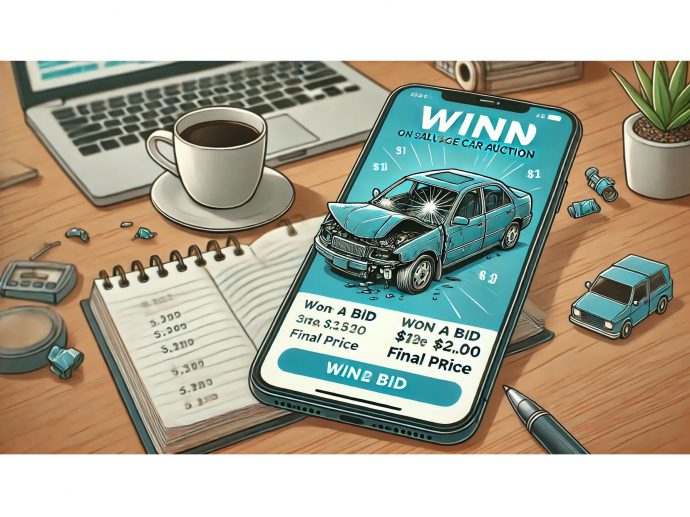Categories more
- Adventures (16)
- Arts / Collectables (15)
- Automotive (37)
- Aviation (11)
- Bath, Body, & Health (76)
- Children (6)
- Cigars / Spirits (32)
- Cuisine (16)
- Design/Architecture (21)
- Electronics (12)
- Entertainment (4)
- Event Planning (5)
- Fashion (44)
- Finance (9)
- Gifts / Misc (6)
- Home Decor (44)
- Jewelry (40)
- Pets (3)
- Philanthropy (1)
- Real Estate (14)
- Services (22)
- Sports / Golf (14)
- Vacation / Travel (60)
- Watches / Pens (14)
- Wines / Vines (24)
- Yachting / Boating (16)
Cruising Through Time: The Untold Story of Salvage Car Auctions in the USA
Published
10/28/2024Have you ever wondered how a beaten-up old car goes from one man's junk to another man's treasure? Follow the twisting roads of America's salvage car auction history with us as we journey into yesteryear—a story every bit as colorful and diverse as a West Coast sunset.
In the old days of insurance claims, writers would leave wrecked cars to rust in dusty lots or direct them right into the jaws of a crusher. People were not interested in recycling twisted metal and broken glass. But some keen-eyed capitalists had already detected the golden opportunity that could be found lurking somewhere amidst the crowded streets of 1940s Los Angeles. They thought, why let these arseholes go to ruin when we can have another crack. That was the inception of salvage, or damaged vehicles being sold at auctions
Old-timers told stories of ad-hoc auctions in vacant lots, with mechanics joining the hordes to bid on busted-up dream cars. The air was redolent with the aroma of oil and promise; all around them people were bidding on everything from dented pickup trucks to banged-up convertibles. For a long time it was the Wild West of car auctions – no regulation, just handshakes and nods used to change hands. The excitement was high, and the deals were… legendary.
Insurance companies, of course, noticed the fast-growing market in ensuing years. They also began to lenient with auctioneers on totaled vehicles, presuming that it was preferable to get a small fraction of their original price compared no cash at all. In time, this change would transform salvage auctions from those ragtag affairs into something more like organized events. Gradually, some regulations were introduced that brought a little discipline to the bedlam. But let me clear - the satisfaction of getting a deal was very much still in tact.
In the 1970s and '80s, wheels turned once more inside industry. With environmental issues and financial considerations, recycling car parts really had no other options. Junkyards were a sandbox that gearheads could play in (without the house lights going up and ending their fun). There was a guy in San Diego who once built an entire Mustang from auction acquired parts—now that's dedication!
And then the digital revolution happened, and oh boy did that change things. The online platforms democratized salvage auctions, moving the dusty lots into living rooms around the nation. From then on, you no longer had to jostle for space through a dense crowd or shout over the din just to place a bid. You were just a few clicks away from being in the game. Copart, IAA and AutoBidMaster were at the forefront, utilizing technology to simplify it for everyone.
That said, it's not entirely been plain sailing. The industry has faced some bumps in the road: regulatory challenges, reservations over vehicle backgrounds and, occasionally, a bad apple trying to scam an unwitting buyer. But much like an old reliable truck slogging through a muddy path, the salvage auction world has managed to navigate these trials with determination and resourcefulness.
Today, salvage car auction is a kind of old and new lethargy. The age-old romance of striking gold literally rubbing shoulders with the absolute pinnacle of technology in how to make that happen. And environmental sustainability as well. Not only does recycling vehicles keep some money in your pocket, but it also gives a shout out to Mother Nature — talk about an automotive double whammy.
And beats on and so, who knows what the future has in store. Electric vehicles and autonomous cars are increasingly common, which suggests that a whole new type of vehicle could go under the hammer. Perhaps we will be scrapping batteries and sensors rather than carburetors and crankshafts. A fascinating thought, and one I certainly look forward to watching play out.
So the next time you are in a traffic jam, staring at the dents on that slightly beaten-up sedan ahead of you¸ remember there is history—a legacy from an industry as robust and adaptable as our country itself. Little did all those original bunch of guys wheelin' and dealin', beat-up cars in vacant lots know they were laying the groundwork for what is now a vibrant, forward-thinking marketplace. Might as well savor it while you can.















